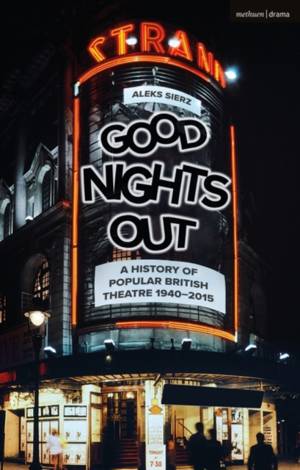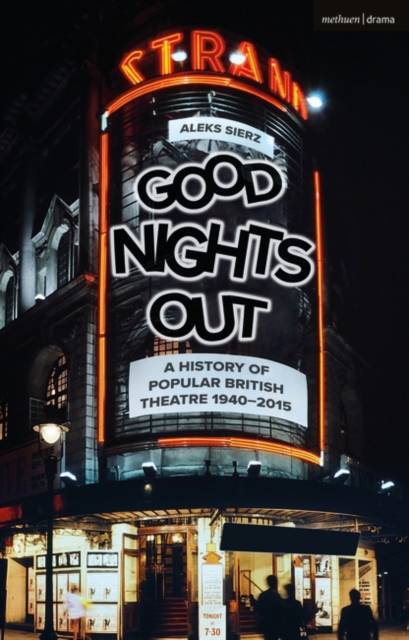
Bedankt voor het vertrouwen het afgelopen jaar! Om jou te bedanken bieden we GRATIS verzending (in België) aan op alles gedurende de hele maand januari.
- Afhalen na 1 uur in een winkel met voorraad
- In januari gratis thuislevering in België
- Ruim aanbod met 7 miljoen producten
Bedankt voor het vertrouwen het afgelopen jaar! Om jou te bedanken bieden we GRATIS verzending (in België) aan op alles gedurende de hele maand januari.
- Afhalen na 1 uur in een winkel met voorraad
- In januari gratis thuislevering in België
- Ruim aanbod met 7 miljoen producten
Zoeken
Good Nights Out A History of Popular British Theatre 1940-2015
A History of Popular British Theatre 1940-2015
Aleks Sierz
Hardcover | Engels
€ 220,45
+ 440 punten
Omschrijving
London's West End is a global success story, staging phenomenal hit shows that have delighted millions of spectators and generated billions of pounds in revenue. In Good Nights Out, Aleks Sierz provides a thematic survey of such popular theatre shows that were enormous commercial successes over the past 75 years. He argues that these outstanding hits have a lot to say about the collective cultural, social and political attitudes and aspirations of the country, and about how our national identity - and theatre's role in creating it - has evolved over the decades.
The book spans a range of work from almost forgotten plays, such as R. F. Delderfield's Worm's Eye Viewand Hugh Hastings's Seagulls Over Sorrento, to well-known mega-hits, such as The Mousetrap and The Phantom of the Opera. Such popular work has tended to be undervalued by some critics and commentators mainly because it has not been thought to be a suitable subject for inclusion in the canon of English Literature. By contrast, Sierz demonstrates that genres such as the British musical, light comedy, sex farce or murder mystery are worth appreciating not only for their intrinsic theatrical qualities, but also as examples of the dream life of the British people. The book challenges the idea that mega-hits are merely escapist entertainments and instead shows how they contribute to the creation of powerful myths about our national life. The analysis of such shows also points towards the possibility of creating an alternative history of postwar British theatre.
The book spans a range of work from almost forgotten plays, such as R. F. Delderfield's Worm's Eye Viewand Hugh Hastings's Seagulls Over Sorrento, to well-known mega-hits, such as The Mousetrap and The Phantom of the Opera. Such popular work has tended to be undervalued by some critics and commentators mainly because it has not been thought to be a suitable subject for inclusion in the canon of English Literature. By contrast, Sierz demonstrates that genres such as the British musical, light comedy, sex farce or murder mystery are worth appreciating not only for their intrinsic theatrical qualities, but also as examples of the dream life of the British people. The book challenges the idea that mega-hits are merely escapist entertainments and instead shows how they contribute to the creation of powerful myths about our national life. The analysis of such shows also points towards the possibility of creating an alternative history of postwar British theatre.
Specificaties
Betrokkenen
- Auteur(s):
- Uitgeverij:
Inhoud
- Aantal bladzijden:
- 240
- Taal:
- Engels
Eigenschappen
- Productcode (EAN):
- 9781350046214
- Verschijningsdatum:
- 12/12/2019
- Uitvoering:
- Hardcover
- Formaat:
- Genaaid
- Afmetingen:
- 155 mm x 236 mm
- Gewicht:
- 521 g

Alleen bij Standaard Boekhandel
+ 440 punten op je klantenkaart van Standaard Boekhandel
Beoordelingen
We publiceren alleen reviews die voldoen aan de voorwaarden voor reviews. Bekijk onze voorwaarden voor reviews.









